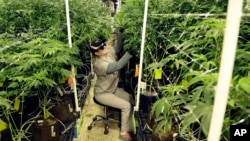The 2020 election led to more American states legalizing marijuana.
Among the states voting to legalize marijuana for recreational use were South Dakota, New Jersey, Arizona and Montana. Voters in Mississippi approved the use of marijuana for medicinal purposes.
Currently, 15 American states permit recreational marijuana, while 36 others have made it legal for medicinal use. The passing of legalization measures in recent years has demonstrated that the efforts generally have had bipartisan support.
In the November 3 election, for example, Republicans captured important congressional races in South Dakota and Montana. The two states also voted to re-elect Republican President Donald Trump. In fact, the recreational marijuana measures got 16 percent higher support among voters than Democratic presidential candidate Joe Biden.
A recent public opinion study by the Gallup organization found that 68 percent of Americans favor the legalization of marijuana. That is two times greater than the percentage of people who said so in 2003.
The study found that just under half of Republicans and people who identify as politically conservative think marijuana should be legal. Of people who said they attend church every week, 48 percent said they favor legalizing the drug.
Matthew Schweich is deputy director of the Marijuana Policy Project, which favors legalization. He told The Associated Press that despite “a war” against marijuana in the U.S. for the past 100 years, “that war has been an abject failure.”
Schweich said criminalization of the drug had led to the jailing of millions of Americans, worsened racism and prevented important medical marijuana research.
Marijuana is still illegal at the federal level. So, it cannot be used to treat people at Veterans Affairs medical centers. Schweich says some veterans suffering from pain have been forced to turn to highly addictive opioid medications.
Bill Stocker is a retired U.S. Marine and former police officer in South Dakota. He voted for President Donald Trump in this year’s presidential election. He told the AP that enforcing marijuana laws gets in the way of going after other drug crimes. He dismissed warnings about the drug being dangerous.
Brendan Johnson is a former federal prosecutor in South Dakota. He supported the state’s marijuana measure. He said the campaign centered on the fact that, in recent years, 10 percent of arrests in the state were for marijuana possession. Most of those arrests involved small amounts of the drug.
“We have a real problem here where we have criminalized an entire generation of South Dakotans, and we’re paying a price,” Johnson said.
Richard Abromeit is the owner of Montana Advanced Caregivers, a group of medical marijuana dispensaries in Billings, Montana.
He told the AP that the passage of recreational marijuana measures can be linked to long campaigns by medical marijuana supporters to educate the public about the benefits of the drug.
Groups supporting legalization are now seeking to get marijuana removed from a federal list of illegal drugs that have no accepted medical use and a high probability of abuse. The listing prevents laboratories from researching new medical treatments using marijuana.
House Majority Leader Steny Hoyer told lawmakers last week that he would hold a vote in December on a bill that would decriminalize marijuana. The measure would also create a process to remove nonviolent marijuana convictions from criminal records and take the drug out of the Controlled Substances Act. It is not clear whether such a bill could pass both the House and the Senate.
I’m Bryan Lynn.
The Associated Press and Reuters reported on this story. Bryan Lynn adapted the reports for VOA Learning English. Ashley Thompson was the editor.
We want to hear from you. Write to us in the Comments Section, and visit our Facebook page.
_______________________________________________________________
Words in This Story
recreational – adj. relating to drugs taken on an occasional basis for enjoyment
bipartisan – adj. relating to or involving members of two political parties
despite – prep. without being affected by
abject – adj. something experienced or present to the maximum degree
addictive – adj. causing or likely to cause someone to become highly depend upon something
prosecutor – n. a lawyer who represents the side in a court case that accuses a person of a crime and who tries to prove that the person is guilty
dispensary – n. a place where medicines are given out
benefit – n. a good or helpful result or effect
conviction – n. when someone is officially found to be guilty of a particular crime
https://learningenglish.voanews.com/a/ma...64841.html
from potads 420 forums for free advertising your products - All Forums learn more


